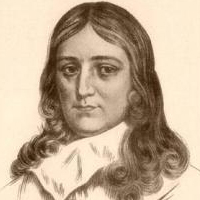On His Blindness by John Milton: Summary and Critical Analysis
By unanimous consent 'On His Blindness' is Milton's best sonnet in which English poetic art attains a sublime height. Actually, it is not a mere poem. It is the inner voice of a man who has resigned himself entirely to the will of God and depends only on His mercy and justice.

John Milton (1608-1674)
On His Blindness is written in the first person, therefore, it is easy to assume that the speaker is the poet himself. The poet loses his sight at an early and productive age, so he feels vulnerable to accomplish his mission of his life. He meditates that his god gifted talent that is poetic talent will remain useless and if it remain useless, God shall be angry at him. He compares his inability to use his talent to the physical, mental and spiritual death. He raises a question if the God still expects some work from him after seizing his eyesight. The poet suspects his own capability that if God is still expecting some service from him, can he be able to accomplish it. Suddenly he realizes his own foolishness to suspect God. God does not require the service of man nor does He take back the gift, one bestowed by Him on man. He is almighty and supreme. It is therefore a folly on his part to think that God requires his services.
Actually they serve him the most who patiently and without a grumble surrender themselves to His will and endure all spiritual, mental and physical sufferings which God may inflict on them. A little calm and careful thinking leads the poet to believe that the question of disservice to God does not arise at all. Of course he is Omnipotent, all powerful and Lord of lords and King of kings. He has countless divine servants, angels, etc., to carry out His commands on land, water and air in the twinkling of an eye. Finally the poet concludes that even if he is blind and unable to do any service to Him, he should only remain loyal to Him. It must be remembered that even silent attendance is also a kind of service to Him.
This sonnet bears Italian structure. It proves clearly that Milton’s faith in God is unshakeable. It is a sonnet which touches the poet personally. The sonnet tells us that Milton became blind when he had run only half the race of his life. He was only 44 when he became totally blind. He was broken down with grief, disappointment and despair. His only hope was his faith in the mercy, kindness and justice of God. The poem gives us a glimpse of Milton’s philosophy of life. The sonnet is replete with abundant pathos. It reflects the personal grief and despair of a poet of Milton’s eminence. The poet was known to possess a noble and lofty character and his conduct was akin to his nature and temperament. He therefore does not lose heart or weep like an ordinary man. He endures suffering with fortitude and bears the loss of his eyesight in a courageous and manly way. Incidentally, this sonnet solves an age-old question. The problem is, does God require the service of man? Milton employs patience to solve this riddle. The answer is that those who resign themselves unquestioningly to the will and wishes of God are his best servants. This idea is repeated with ample emphasis twice in this sonnet.
Like the outstanding characteristic of all great and good poetry, this sonnet has a universal appeal, far from being a mere poem. It is barely a divine message of the afflicted people of the world, to mankind as whole, that has unbounded faith in God’s mercy and generosity. The poem is rich in noble ideas, sublime thoughts and unbounded bliss. It raises Milton very high in public estimation and makes him immortal. Milton has used two very effective poetic devices in this poem: allegory and personification. An allegory is a story in which events and characters stand for some other situation and people. In this poem the poet persona “I” may represent all the human beings having eyes spiritually in darkness. Personification on the other hand is a technique in which abstract concepts and qualities such as love, hatred, and jealousy are represented as person. In this sonnet Milton has personified ‘patience’ which speaks to him and rescues him from his dilemma. If we look at the form of this sonnet, we shall find it different from the Shakespearian or Italian sonnet. The rhyme scheme is abba abba cde cde but the division between sestet and the octave is not neat as in an Italian sonnet. The sentence of the sestet begins on the line of the octave itself.
Related Topics
Paradise Lost: Summary and Analysis
Samson Agonistes: Summary and Analysis
 |
bachelorandmaster.com |